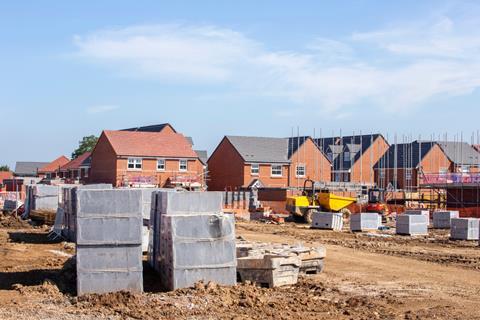Capital Economics predicts drop will come amid steep house price falls as mortgage rates rise
Housing starts are predicted to fall by nearly 40% next year, according to revised forecasts produced by Capital Economics in the wake of the government’s controversial ‘growth plan’.
The research house said that UK housing starts were now likely to fall from a predicted 178,000 homes this year, to just 110,000 next year, on the back of an 13.6% fall in “real” house prices across 2023.
Capital Economics, which has previously predicted housing market falls, came out with a prediction of 10%-15% falls in house prices in a matter of days after chancellor Kwasi Kwarteng announced his mini-budget statement on 23 September.
It predicted that house prices will fall due to the sharp rise on mortgage lending rates which have been seen amid expectations the Bank of England will be forced to further raise rates to counter the inflationary impact of the growth plan.

However, Capital Economics has now produced more detailed forecasts which included its prediction of the impact upon housebuilding rates.
The forecast said that housing starts will hit 110,000 – a drop of 38% on the figure expected for this year – for both 2023 and 2024, before a recovery to just 130,000 in 2025. The figures would represent a sustained period of reduced construction levels if borne out.
>> Also read: After the storm: housebuilding’s prospects following the mini-budget
The forecast predicts that completions will drop more slowly, with expected completion of 187,000 this year falling by 14% to 160,000 in 2023, before hitting 140,000 in 2023 and 2024.
The figures produced by Capital Economics claim that when factoring in the impact of high rates of inflation elsewhere in the economy, the real terms peak-to-trough drop in house prices in the next two years is likely to be between 20% and 25%, with a “nominal” drop in prices of just over 10%.
Capital Economics’ gloomy prediction comes after a raft of forecasters, including Credit Suisse, have predicted double digit house price falls over the next year.
According to financial data service Moneyfacts.co.uk, the average mortgage rate for both two- and five-year fixed rate mortgages has now risen well above 6%, almost 1.5 percentage points higher than average rates prior to the mini budget.
Capital Economics’ senior economist Andrew Wishart said the interest rate movements mean repayments on an average priced home under a 75% loan-to-value mortgage could go up from £620 per month, for someone that took out a mortgage last year, to £1,120, causing such a reduction in buying power that it “makes a significant drop in house prices inevitable”.
The forecast comes amid evidence that developers reliant on cost-effective lending to fund development finance, which is particularly important for schemes being built for rent, are reviewing if projects can go ahead.
Student developer Unite today said it was “reviewing our future investment plans […]in light of rising funding costs for new debt”, while last week build to rent developer Watkin Jones issued a profit warning after admitting that “recent market volatility” had hit sales.
Paul Hackett, chief executive of housing association Optivo said that he had paused a pipeline of six development sites which weren’t under contract in order to review viability in the light of new lending rates.
He says: “The change [in borrowing rates] has really affected scheme viability. Now we’ve got to review all our schemes on a scheme by scheme basis to see what we can do.
“This is an issue affecting the whole sector. There’ll be a direct impact on housing starts – even if it’s only a temporary blip.”


























No comments yet